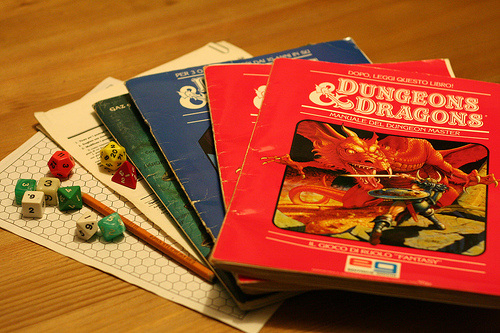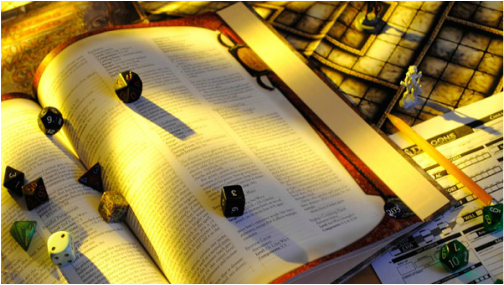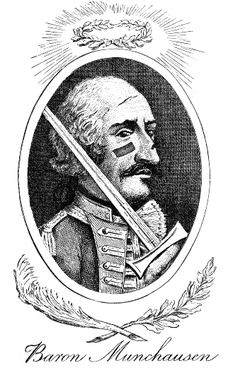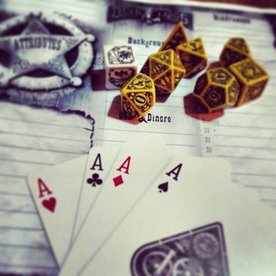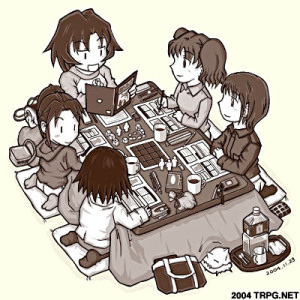I started playing tabletop roleplaying games (tRPGs) about 4 years ago. I started running tRPGs about 3 years and 11 months ago. I ran an Introduction to tRPGs session about two weeks ago. This is what I've learned.
Know Your Audience
I am fairly well versed with tRPGs. I can pick up a corebook, read through the rules and come to a fairly good understanding of how the game will play out. My audience at the Intro were not. Most had never played a tRPG before.
But many had played computer games, and potentially computer RPGs, as well as boardgames before. So, they weren't completely in the dark, but there was no way they'd be playing a full session of Dungeons and Dragons 5th edition straight off the bat, even though that's what many of them wanted to do.
It's important to know what your players expect out of a roleplaying experience; sometimes just to break those expectations. I sold tRPGs not as an experience in playing mechanically satisfying characters, min-maxing stats or tactical decision-making, but one about shared storytelling. This made it easier for everyone to get into it the game, focusing more on how they wanted their characters to act, rather than on the sometimes indecipherable character sheets.
Knowing that I had a few hours, about 12 people, mostly with no tRPG experience, with the idea that roleplaying games are about shared storytelling, one GM (myself) and the audience's desire to dip their toes into D&D 5E, I was ready to head onto the next step.
But many had played computer games, and potentially computer RPGs, as well as boardgames before. So, they weren't completely in the dark, but there was no way they'd be playing a full session of Dungeons and Dragons 5th edition straight off the bat, even though that's what many of them wanted to do.
It's important to know what your players expect out of a roleplaying experience; sometimes just to break those expectations. I sold tRPGs not as an experience in playing mechanically satisfying characters, min-maxing stats or tactical decision-making, but one about shared storytelling. This made it easier for everyone to get into it the game, focusing more on how they wanted their characters to act, rather than on the sometimes indecipherable character sheets.
Knowing that I had a few hours, about 12 people, mostly with no tRPG experience, with the idea that roleplaying games are about shared storytelling, one GM (myself) and the audience's desire to dip their toes into D&D 5E, I was ready to head onto the next step.
Choose the Right System
I've never run a tRPG session for more than five people. I'd be stretching it here with 6-7, but 12 wasn't going to happen. We'd have to split the party and usually that doesn't work out too well, especially with one group having to play a game without a GM. So, I had to look for GM-less games, of which there are plenty.
One of the first I came across was Everyone is John, a morbid, but hilarious take on a simple man who is controlled by a set of competing voices within his head, each with their own rather horrifying goal. The players compete to control John's actions, often resulting in hilarious situations, but the goals each player is aiming for leaves a sour taste in the back of the mouth, if it's not played with the right audience.
A second game was the Extraordinary Adventures of Baron Munchausen. Playing with the Es-Sindibad rules, each player takes on the role of a Baron or Baroness, weaving a tale about their extraordinary adventures, except that all of the other players provide the narrative touchstones that the Baron or Baroness must include. A far more light-hearted game, it was much more appropriate for the image of roleplaying games that I wanted to portray, especially with that focus on shared storytelling.
For the other game, I didn't have much of a choice; the audience wanted D&D 5E. So, that's what I provided, but a version tailored to the situation. Because of time constraints, single session of play, and player knowledge limitations, I chose an exploration focused mini-delve for the session, as well as ignoring most of the player character's passive abilities.
While this did mean that players didn't get to experience the full extent of their characters, they did get to play the game, understand how to describe their characters' actions, read their character sheets, roll dice and flow with the result.
Taking into consideration the audience, choose the system that best suits. If you have a bunch of really engaged players, they've probably already suggested a system or two to you. If you don't, take a well known system and simplify it (like D&D 5E), or choose a simple system to begin with (like the Cypher System).
One of the first I came across was Everyone is John, a morbid, but hilarious take on a simple man who is controlled by a set of competing voices within his head, each with their own rather horrifying goal. The players compete to control John's actions, often resulting in hilarious situations, but the goals each player is aiming for leaves a sour taste in the back of the mouth, if it's not played with the right audience.
A second game was the Extraordinary Adventures of Baron Munchausen. Playing with the Es-Sindibad rules, each player takes on the role of a Baron or Baroness, weaving a tale about their extraordinary adventures, except that all of the other players provide the narrative touchstones that the Baron or Baroness must include. A far more light-hearted game, it was much more appropriate for the image of roleplaying games that I wanted to portray, especially with that focus on shared storytelling.
For the other game, I didn't have much of a choice; the audience wanted D&D 5E. So, that's what I provided, but a version tailored to the situation. Because of time constraints, single session of play, and player knowledge limitations, I chose an exploration focused mini-delve for the session, as well as ignoring most of the player character's passive abilities.
While this did mean that players didn't get to experience the full extent of their characters, they did get to play the game, understand how to describe their characters' actions, read their character sheets, roll dice and flow with the result.
Taking into consideration the audience, choose the system that best suits. If you have a bunch of really engaged players, they've probably already suggested a system or two to you. If you don't, take a well known system and simplify it (like D&D 5E), or choose a simple system to begin with (like the Cypher System).
Be Prepared
This was probably the bit that I did worst, but that's about par for the course really. My main problem was that I was attending a conference the week of the event and volunteering for the same conference the week before.
This meant that I hadn't even read the rules for either system until the day of the event. I managed to make all of my 5E characters, which take at least half an hour each, print out the rules for the Baron and collect everything I needed in the last half a day and somehow managed to make it work, though I wouldn't suggest this method to anyone else.
Having played D&D 4E before and generally knowing how those rules translated to 5E, I managed to get by, but nothing beats preparation. This includes having the right space, where players can engage with minimal distractions. So, I was prepared, just.
At the very least make sure you understand the necessary rules for the session you're running. For a more traditional campaign style structure, where you're going to be meeting up regularly, make sure your players have also read the rules relevant to them.
One step better would be to play in a game using the system you want to run before running your own game. As I said at the top, I began running my own game just one month after I started playing, because I felt confident enough with the system after reading most of the rules and having played maybe two sessions. But, when none of that works out...
This meant that I hadn't even read the rules for either system until the day of the event. I managed to make all of my 5E characters, which take at least half an hour each, print out the rules for the Baron and collect everything I needed in the last half a day and somehow managed to make it work, though I wouldn't suggest this method to anyone else.
Having played D&D 4E before and generally knowing how those rules translated to 5E, I managed to get by, but nothing beats preparation. This includes having the right space, where players can engage with minimal distractions. So, I was prepared, just.
At the very least make sure you understand the necessary rules for the session you're running. For a more traditional campaign style structure, where you're going to be meeting up regularly, make sure your players have also read the rules relevant to them.
One step better would be to play in a game using the system you want to run before running your own game. As I said at the top, I began running my own game just one month after I started playing, because I felt confident enough with the system after reading most of the rules and having played maybe two sessions. But, when none of that works out...
Act ConfidEnt
The most enjoyable aspect of the session to many in the audience was playing the Extraordinary Adventures of Baron Munchausen. I hadn't even read the rules till a few hours before I explained the game to them, let alone played the game. Something that I didn't tell anyone until the session was over and came to the surprise of many who had stuck around afterwards sharing stories.
What had sold them on the game, more than my "apparent" knowledge of how the game worked, was the enthusiasm and confidence with which I pitched the game and explained the rules. As someone who loves tRPGs, it wasn't too hard for me to take my passion and put it into "selling" the audience a game I had never played myself, because I knew from reading the rules they would have fun, once the ball got rolling. To help it along, I also chose some of the more confident people in each group to start off as the Baron or Baroness and get everyone else engaged.
My confidence in running the 5E game came from experience running 4E games before and the knowledge that, in this case, I could get away with not knowing the rules perfectly and making stuff up as I went along, to ensure that the players were having a good time.
Being confident doesn't mean always being right, but stating your view clearly and accepting that it might be refuted by the rules later on. Sometimes, like with my pitch for the Baron, it means faking it too, so long as the intent and result are beneficial to your audience. If you are passionate about something, that just makes it easier.
What had sold them on the game, more than my "apparent" knowledge of how the game worked, was the enthusiasm and confidence with which I pitched the game and explained the rules. As someone who loves tRPGs, it wasn't too hard for me to take my passion and put it into "selling" the audience a game I had never played myself, because I knew from reading the rules they would have fun, once the ball got rolling. To help it along, I also chose some of the more confident people in each group to start off as the Baron or Baroness and get everyone else engaged.
My confidence in running the 5E game came from experience running 4E games before and the knowledge that, in this case, I could get away with not knowing the rules perfectly and making stuff up as I went along, to ensure that the players were having a good time.
Being confident doesn't mean always being right, but stating your view clearly and accepting that it might be refuted by the rules later on. Sometimes, like with my pitch for the Baron, it means faking it too, so long as the intent and result are beneficial to your audience. If you are passionate about something, that just makes it easier.
Conclusions
The main thing to do before running your first tabletop RPG session is to be prepared. Preparation means
- you've done your research,
- preferably played a game,
- selected a system you will enjoy running and your players will enjoy playing,
- made sure every knows the rules relevant to them,
- selected a good place to play, and
- have enough of a story prepared for the next session.
